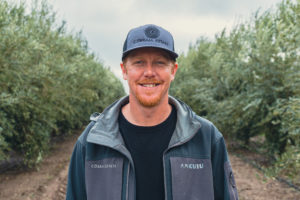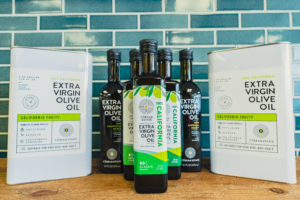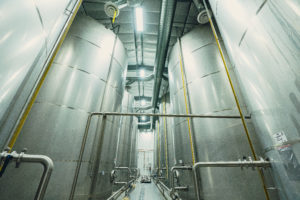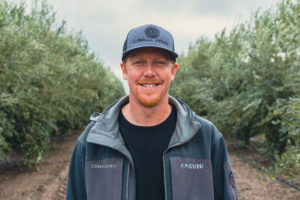Growing Together Winter 2022
Olives: The New Kid on the Block
As the American consumer discovers its range of health benefits — from immune support to digestive health — demand for olive oil and related products is skyrocketing in the U.S. There’s just one problem: Domestic production isn’t keeping up. Working with Grow West, Jordan Fricke and his team are out to change that.

The Operations Manager for Boundary Bend Olives, owners of the growing olive oil brand Cobram Estate, is pushing a new frontier for olive production in California, specifically Yolo County, where growing conditions are ideal for the crop. He sees the crop’s expansion in the U.S. as a trend that can help growers contribute to a larger share of domestic consumption in a marketplace that has a lot of upside potential. There’s a lot more demand for olive oil than there is stateside production, and Fricke and his team are working with Grow West and other industry partners to increase production and create new revenue streams for California growers.
“California and the U.S. in general produces about five percent of the olive oil consumed in the country. The remaining roughly 95% is imported,” Fricke said. “There’s a lot of room out there in the market for California and the U.S. to grow olives. That’s what Cobram Estate saw: there’s a large market to be captured.”
Why Yolo County is poised to become an olive leader
That’s what Fricke, entering his sixth year with Boundary Bend Olives, is doing in Yolo County. Boundary Bend Olives markets extra virgin olive oil both under the Cobram Estate label as well as some of the largest private-label products for retailers in the U.S. To meet the growing demand at the myriad retailers offering the company’s oil and products, Fricke is growing the company’s presence in and around Woodland, California, where it has oil processing, storage and bottling facilities.

That process currently involves building on Boundary Bend Olives’ own groves as well as a growing number of grower partners. Those partners produce multiple varieties that are processed and blended depending on the type of oil product consumers demand. The company has product distribution as far away as the East Coast, giving it a truly national presence even though most of the domestic olive production is in Yolo County. The area has ideal soil and weather conditions for the crop that has meaningfully lower water and resource needs compared to other permanent crops common in the Sacramento Valley. The company also operates Modern Olives, a quality laboratory and consulting business in Woodland, where it tests every batch of olive oil produced to ensure it meets quality standards to be marketed as extra-virgin olive oil. Additionally, Modern Olives conducts research and provides growers with the latest technical information regarding profitable olive farming.
Being a relatively new crop to the U.S. and California marketplace, the data and knowledge gleaned from years of experience with other local crops is largely missing for olive growers. That’s a major area of emphasis for Fricke and his team as domestic production ramps up. And it’s a part of the equation of which the Grow West team is an integral part.

“We supply information and data to growers to help their technical teams and PCAs improve the quality and quantity of their crops. It’s not only producing more yields and better oil but limiting the amount of water they use and being more efficient with fertigation and chemical applications,” Fricke said of his company’s working relationship with Grow West. “We’re constantly collecting olive samples and making observations to optimize water usage, fertilizer management, harvest timing and other factors important to growers. We’re monitoring and collecting data year-round, so the grower knows we’re there to help them if there’s an area for improvement. In this way we are able to get to harvest with no surprises and produce the highest quality extra-virgin olive oil.”
How Grow West is part of the team leading California olive growth
Grow West PCAs serve as the “boots on the ground” that do the same for Fricke and his team, providing data and information on tree health, growing conditions and production issues growers face throughout the crop year so the company can maintain a strong, uninterrupted and seamless supply chain.
“Data and communication are so important in all crops, but especially in olives,” Fricke said. “Though there’s competition on the sales side of the olive oil market, everyone collaborates and works together to make sure California olive growers are successful.”
At the grove level, that means applying technology that can enable olive growers to maintain the highest levels of quality and quantity in what they produce. In addition to using data to enable growers and their advisers to make informed decisions on things like tree pruning, fertigation, nutrient applications and irrigation, the olives that Boundary Bend Olives grows for its brand, Cobram Estate, are grown in medium-density systems. Though California olive growers have traditionally produced in higher-density systems that comprise 600 or more trees per acre, Fricke favors medium-density systems closer to 200 trees per acre.
“High-density systems limit the number of varieties we can grow, so we have chosen to raise olives in medium-density systems with 200 trees per acre. This allows us to grow a broad range of varieties which produce the unique and exclusive olive oil we sell in the stores,” Fricke said. “We can select varieties that produce the specific flavor profiles consumers are after.”
Harvesting olives this way created a unique challenge for the Boundary Bend Olives team. To address the need, Fricke’s team developed a specialized harvester that’s capable of capturing as many as 95% of ripe olives from the 10-foot-wide, 16-foot-tall trees in the process.
“Olive trees are normally alternate bearing trees with a good crop one year, then a ‘recharge’ year right after that. It’s normally an up-and-down cycle, so we have been working to fine tune the entire production and harvesting process, continuously focusing on incremental improvements as we grow production” said Fricke, who grew up on a Yolo County diversified farm. “For example, with our unique management system, we’re able to improve alternate bearing tendencies of olive trees.”
Why there’s a bright future for California olives
Raising olives for oil, supplements and other products in California is a year-round enterprise given the amount of data collection and analysis needed to be successful. Looking into the future, Grow West will continue to be Boundary Bend Olives’ partner in managing the crop inputs and production technology necessary to make that happen. Given the upside potential for olive production in the heart of Grow West’s territory, the partnership will continue to grow in importance in the next decade and beyond.
“Since the beginning of Boundary Bend Olives here in California, Grow West has been a trusted partner to produce the safest, highest-quality oil out there. When we need products and services, we get them easily and effectively. The Grow West team is there in all facets, not just sales. They’re always willing to learn alongside us too,” Fricke said. “We want our growers, production partners and the consumer to know California can achieve the goal of being the top producer of high-quality olive oil. California has the growers and perfect climate and soil for olives. We will continue to see them skyrocket as a California crop in the next 10 years.”

